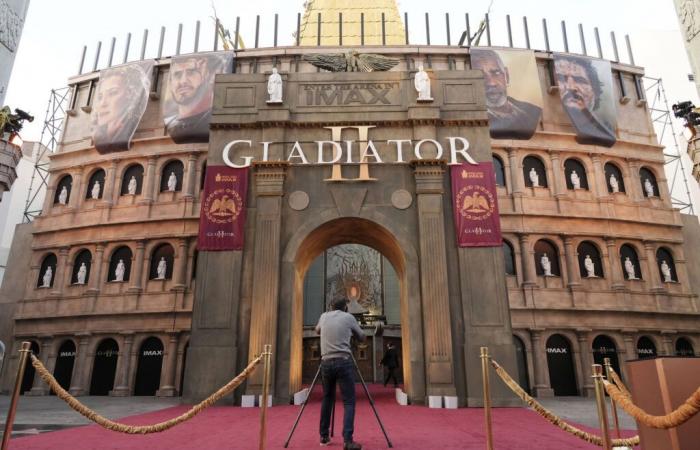Skip this first paragraph if you don’t want to read the soap opera-like plot spoilers. The story in Gladiator II revolves around Lucius Verus Aurelius (played by Paul Mescal), son of Maximus (the Russell Crow character in GII) and grandson of philosopher Emperor Marcus Aurelius; his mother Lucilla who sent him into hiding when he was a child, and General Acacias, her current husband.
The subplot sees the adult Lucius winding up as a champion in the Gladiatorial arena in Rome’s Colosseum, where his goal is to kill Acacias who led the attack on Numidia which caused the death of Lucius’ own wife, Arishat, an archer in the army of Numidia. Lucius upward climb is assisted by gladiator owner and arms dealer Macrinus (Denzel Washington in a standout performance) who has his own plan to become emperor, using Lucius as his instrument to kill Acacias. Against this soap opera background is the semi-historical plot of Restoring the power of the Senate with help from Senator Gracchus (Derek Jacobi), Lucilla, and Acacius. However, this later plot is not revealed as the goal until about an hour in.
The Easter egg hunt: Tropes and symbols
Gladiator II opens with a vividly powerful naval battle attacking the coast of Numidia. Meanwhile, we are treated to the doomsday pronouncements of the end of times that every generation believes they live in when things go horribly wrong. Having been moved to Numidia from a village in Giza, which only seems to be there because pyramids, Lucius survives this battle. It seemed unrealistic, but it may have been intended to show how special he is, particularly as ports are busy places, not logical places to hide. Numidia is a strange choice for other reasons in that it had long been part of the Empire. Perhaps the location is obscure enough to non-historians given its lack of notoriety in general histories.
Taking part of the arrow embedded in his murdered wife seemed like a realistic and sentimental gesture on the part of Lucius. We know that in Mediterranean archaeology from the Bronze Age onwards that keeping tokens from a special event was a common, cross-cultural practice. It serves as the motive that pushes Lucius on his quest.
A number of ancient historians have been critical of Macrinus’ depiction as a dandified, objectified, and otherised nouveau riche power broker. Personally, I was reminded of a powerful Russian oligarch combined with the late Yevgeny Prigozhin of Wagner Group infamy. And yet Macrinus’ depiction seems restrained and tasteful compared to the Orientalised depiction of Xerxes in The 300, not to mention the over the top depictions of Geta and Caracalla.
I found these two to be quite creepy, invoking the trope of equating corruption with feminised weakness also drawing on past cinematic depictions of weak villainous emperors like Caligula. It’s been widely reported that Caracalla’s character was modelled on Sid Vicious, while Geta drew from Johnny (Lydon) Rotten for his character. Although I come from the generation that moshed away a few brain cells at Sex Pistols concerts, I was more reminded of John Hurt’s performance in I, Claudius.
When Caracalla threatens to gut Acacias in a fit of anger, in truth, he looks like he couldn’t gut a guppy. In another reference to Caligula making his favourite horse Incitatis a Senator, Caracalla elevates his pet monkey Dondas to First Consul. Suffice to say that the dual Emperors look far more emasculated than the black slave trader looks objectified.
A minor character from both movies, Derek Jacobi reprises a minor role as Senator Gracchus. It seems probable that the choice of name is referencing populist Tribunes, Tiberius and Gaius Gracchus, of the late Republic who sought land reform for the poor.
It’s never really explained, but another minor character is the elderly female servant portrayed on a couple of occasions eavesdropping while Acacias talks to his wife. Her only real reason for being there seems to be to remind genre fans of the trope of Memnet, the old woman spying on Moses and his adoptive mother in the Ten Commandments.
My favourite theme is the contest between champions, where Lucius fights Acacias. Such contests are well known in myth and literature: Hector and Patroclus in the Iliad, Gilgamesh and Enkidu, David and Goliath. However, the fight between Lucius and Acacias most reminds us of the story of the Horatii v the Curiatii as recounted in Livy and later made famous during the French Revolution in the painting Oath of the Horatii by Jacques Louis David.
The painting represents a fictional moment depicting the Horatii brothers of 7th century BCE Rome taking an oath to their swords held up by their father in the light, symbolizing patriotism and masculinity. The mother and young women are in shadow, bowing in grief: one is from the Curatii family and married to one of the Horatii while another is of the Horatii family and engaged to one of the Curatii. Whichever way the battle is resolved, will bring pain and suffering to the women. This is precisely the situation we see in the gladiatorial dual between Lucius, son of Lucilla and Acaccias, husband of Lucilla.
Lights, Camera, Action…
The Gladiatorial games bring the stories and artworks many of us are familiar with to life. The early scene of the naval assault on Numidia is especially vivid. The Naval battle in the Colosseum seems believable, although I’m informed that sharks weren’t used. When (Lucius) shot a cross bow at the Emperor, many in the arena confess to the assault, recalling all the slaves confessing “I’m Spartacus” at the end of that movie. The private banquet scene with a cooked hippo splayed on a table where Lucius wins a private fight put on for the entertainment of the two Emperors does a good job of quickly establishing the decadence and wealth of oligarchic Rome. It also does a good job of advancing Lucius towards his goal of moving up to where he is in a position to achieve his goal of revenge.
Conclusion
Reforming Roman corruption in the nostalgic hope of re-establishing the “good old days” of the Republic where a sclerotic Senate was not up to the task of governing an increasingly vast empire seems to be the main theme of the movie. This tired trope is seemingly found in every movie dealing with imperial Rome.
GII is not an adaptation based on historical events, rather it is an entertaining epic set against a historical backdrop. GII is not an adaptation based on historical events, rather it is an entertaining epic set against a historical backdrop as discussed by Sarah Bond in Hyperallergic and in Screen Rant. Given that nine out of ten people no longer read or believe in MSM, or legacy content providers, the historical context may not mean much to many moviegoers. If your knowledge of history is sketchy, you like soap operas, or you are a fan of the epic genre looking for cinematic Easter eggs, and/or battle scenes, then Gladiator II is for you.
Despite the melodramatic, but thin plot juxtaposed with exciting battle-scenes, Gladiator 2 retains and promotes the Stoic philosophy of Hellenistic Athens and amplified by Marcus Aurelius, a persistent leitmotif in the Gladiator series: To become strong is to become unlike the one who committed the injury and the best revenge against an enemy is to not become like him (or her).
*Louise Hitchcock, former Professor of Aegean Bronze Age Archaeology in the University of Melbourne’s Classics and Archaeology Program, holds a BA in Political Science from USC and both an MA and PhD from UCLA, specialising in Bronze Age Aegean Art History. She is the author of several key works, including Minoan Architecture, Theory for Classics, and Aegean Art and Architecture. Her current focus is on Aegean, Cypriot, and Philistine identities.






